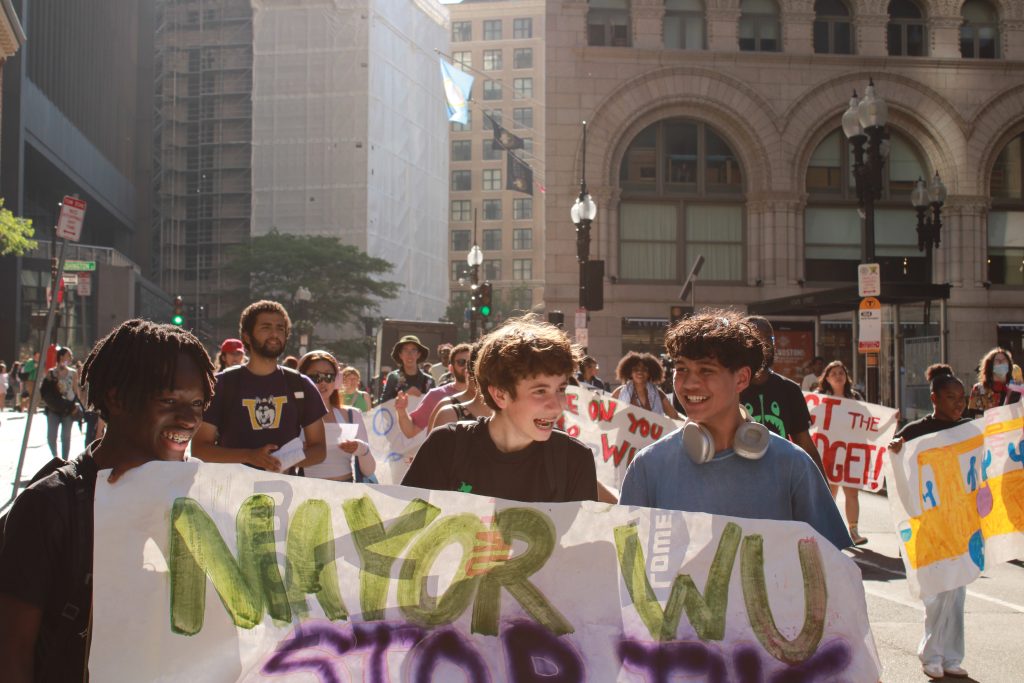[[{“value”:”
By Vanessa Bartlett
BOSTON — Last Friday, members of Youth Jobs and Power Union (YJPU) rallied with other community members in front of City Hall to demand that Mayor Michelle Wu accept the budget amendments added by the Boston City Council to increase funding for youth jobs, housing and other community support programs.
The budget amendments passed by the City Council in a 10-3 vote would have allocated an additional $2 million for youth jobs and $2.25 million for rental assistance and land trusts. They would also have shaved $3 million from the mayor’s proposed $50 million increase to the police budget.
In a letter to the City Council, Wu explained her choice to veto many of their proposed budget amendments, which would have reallocated $15.3 million, and defended increasing the police budget by over $50 million.
“We restore funding to ensure effective operations in core city services and public safety, including where new funding is needed for the Boston Police Department to operationalize contract reforms in modernizing paid details, upgrading technology, and other planned improvements,” wrote the mayor. Although she vetoed many of the budget changes proposed by the City Council, Wu kept $750,000 in additional funding for youth jobs, and an additional $500,000 for housing.
In 2020, community efforts resulted in a decrease in the police budget from $414 million to $404 million, and in 2022 the police budget was decreased to $395 million. Following Wu’s election in 2021, however, the police budget was increased to $405 million. Wu’s proposed 2025 budget would now give the police $455 million.
“We want the money that she’s putting into Boston police, which is actually doing more damage than good, to actually put it into the resources we need, like youth jobs and affordable housing,” said Victoria Wite, a 15-year-old Dorchester resident who helped organize the rally.
Victoria Wite, 15, said that when she injured her foot, money from her youth job helped her pay for transit.
Funding for youth jobs and for the police both have noticeable effects on the lives of children in Boston, said Khalil Howe, an adult supporter of YJPU. Howe said when kids have well-paid summer jobs, they are less likely to be harassed by police.
“Over-policing for kids in Boston looks like being locked up, having police sirens constantly going on in their neighborhoods, having police at construction sites, having police in their schools,” said Howe. Constant police presence makes kids feel “like they’re a criminal.”
Youth jobs give kids from Boston a chance to feel connected to their communities. Janaiah Noel Lee, a 17-year-old high school student in YJPU, said her youth job has taught her public speaking skills and gave her “more knowledge about how we can really fight for our community.”
Lee, a 17 year old high school student who talked about the benefits of youth jobs.
Community groups from Boston have come together to form the Better Budget Alliance, which advocates for funding for community projects. In a press release, members of the Alliance urged Wu to “respect the City Council’s new powers as co-creators of the City budget, and to fully accept the important investments the City Council has made in community priorities including anti-displacement, housing stabilization, youth jobs, and migrant crisis support.”
Source: City of Boston
“In my community, we know that affordable housing and just mental health crisis response keep us safe, not police. There are so many youth wishing for a home and a community that cares. People deserve to have resources in their communities,” said Alexa Santana, one of the speakers at the YJPU rally on Friday. “People deserve real safety, not police. I’m angry and disappointed in Mayor Wu.”
In her 2024 State of the City address, Wu guaranteed a summer job to every BPS student who wanted one. Unfortunately, according to the City’s Office of Youth Employment and Opportunity, which oversees job placements for Boston youth, the City fell short of its goal. Out of 12,000 applicants, approximately 9,000 youths in the Boston area were placed with jobs, and of those, 5,500 positions were funded by the City. That means roughly 3,000 youths who wanted to work were not placed.
Eliza Parad, a member of the Better Budget Alliance, said that community groups spoke with a wide range of Boston residents to work out a budget proposal for community programs that totaled $35 million. While not providing the ideal amount of funding, the City Council’s proposed budget amendments reflect many of the priorities identified by the group. “Vetoing most of the amendments means that [the mayor] is not respecting the will of the voters,” Parad said.
The mayor’s veto is not the final word on the budget. The budget will now return to the City Council for a final vote. If the Council can assemble a two-thirds supermajority, they will be able to override the mayor’s veto.
One sign at the rally, a giant certificate of achievement for Mayor Wu: “Biggest Disappointment Ever”.
Although the mayor’s proposed budget for 2025 does increase funding for youth jobs, housing and other programs, the stunning $450 million figure for police stands out.
“A budget is a reflection of values, and the police budget has $450 million. It’s the second biggest slice of the budget after the public school budget. And compared to, let’s say, housing, which has a total of 40-something million — and we’re in the middle of an ongoing housing crisis,” Parad said. “When you compare things like that, you see that the City values policing, and that policing has a disparate impact on black and brown residents and young people… it’s kind of doubling down on that.”
Vanessa Bartlett is a staff organizer for UAW, an editor of Working Mass, and a member of Boston DSA. She has a background in print and radio journalism, but please don’t hold that against her.
“}]]

